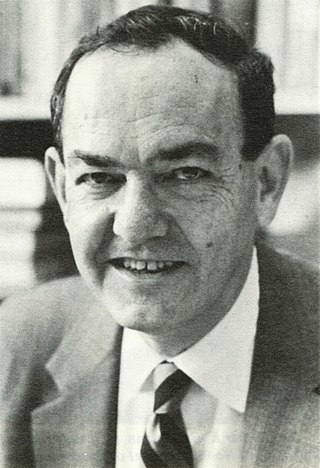Related Research Articles

Herbert Alexander Simon was an American political scientist whose work also influenced the fields of computer science, economics, and cognitive psychology. His primary research interest was decision-making within organizations and he is best known for the theories of "bounded rationality" and "satisficing". He received the Turing Award in 1975 and the Nobel Memorial Prize in Economic Sciences in 1978. His research was noted for its interdisciplinary nature, spanning the fields of cognitive science, computer science, public administration, management, and political science. He was at Carnegie Mellon University for most of his career, from 1949 to 2001, where he helped found the Carnegie Mellon School of Computer Science, one of the first such departments in the world.

Rational choice theory refers to a set of guidelines that help understand economic and social behaviour. The theory originated in the eighteenth century and can be traced back to the political economist and philosopher Adam Smith. The theory postulates that an individual will perform a cost–benefit analysis to determine whether an option is right for them. Rational choice theory looks at three concepts: rational actors, self interest and the invisible hand.

A cognitive bias is a systematic pattern of deviation from norm or rationality in judgment. Individuals create their own "subjective reality" from their perception of the input. An individual's construction of reality, not the objective input, may dictate their behavior in the world. Thus, cognitive biases may sometimes lead to perceptual distortion, inaccurate judgment, illogical interpretation, and irrationality.
Bounded rationality is the idea that rationality is limited when individuals make decisions, and under these limitations, rational individuals will select a decision that is satisfactory rather than optimal.

Behavioral economics is the study of the psychological, cognitive, emotional, cultural and social factors involved in the decisions of individuals or institutions, and how these decisions deviate from those implied by classical economic theory.

Science studies is an interdisciplinary research area that seeks to situate scientific expertise in broad social, historical, and philosophical contexts. It uses various methods to analyze the production, representation and reception of scientific knowledge and its epistemic and semiotic role.

Decision theory or the theory of rational choice is a branch of probability, economics, and analytic philosophy that uses the tools of expected utility and probability to model how individuals should behave rationally under uncertainty. It differs from the cognitive and behavioral sciences in that it is prescriptive and concerned with identifying optimal decisions for a rational agent, rather than describing how people really do make decisions. Despite this, the field is extremely important to the study of real human behavior by social scientists, as it lays the foundations for the rational agent models used to mathematically model and analyze individuals in fields such as sociology, economics, criminology, cognitive science, and political science.

Jon Elster is a Norwegian philosopher and political theorist who holds the Robert K. Merton professorship of Social Science at Columbia University and since 2005 professor of social science at the Collège de France.

Risk perception is the subjective judgement that people make about the characteristics and severity of a risk. Risk perceptions often differ from statistical assessments of risk since they are affected by a wide range of affective, cognitive, contextual, and individual factors. Several theories have been proposed to explain why different people make different estimates of the dangerousness of risks. Three major families of theory have been developed: psychology approaches, anthropology/sociology approaches and interdisciplinary approaches.
In moral psychology, social intuitionism is a model that proposes that moral positions are often non-verbal and behavioral. Often such social intuitionism is based on "moral dumbfounding" where people have strong moral reactions but fail to establish any kind of rational principle to explain their reaction.
In the philosophy of economics, a descriptive or positive statement is an assertion about facts of the world, while prescriptive or normative statements express value judgments. The former describe the world as it is, while the latter talk about the world as it should be. The methodological basis for positive/normative distinction is rooted in the fact-value distinction in philosophy.

Donald Thomas Campbell was an American social scientist. He is noted for his work in methodology. He coined the term evolutionary epistemology and developed a selectionist theory of human creativity. A Review of General Psychology survey, published in 2002, ranked Campbell as the 33rd most cited psychologist of the 20th century.
The cultural cognition of risk, sometimes called simply cultural cognition, is the hypothesized tendency to perceive risks and related facts in relation to personal values. Research examining this phenomenon draws on a variety of social science disciplines including psychology, anthropology, political science, sociology, and communications. The stated objectives of this research are both to understand how values shape political conflict over facts and to promote effective deliberative strategies for resolving such conflicts consistent with sound empirical data.
In psychology, the human mind is considered to be a cognitive miser due to the tendency of humans to think and solve problems in simpler and less effortful ways rather than in more sophisticated and effortful ways, regardless of intelligence. Just as a miser seeks to avoid spending money, the human mind often seeks to avoid spending cognitive effort. The cognitive miser theory is an umbrella theory of cognition that brings together previous research on heuristics and attributional biases to explain when and why people are cognitive misers.
Robyn Mason Dawes was an American psychologist who specialized in the field of human judgment. His research interests included human irrationality, human cooperation, intuitive expertise, and the United States AIDS policy. He applied linear models to human decision making, including models with equal weights, a method known as unit-weighted regression. He co-wrote an early textbook on mathematical psychology.
Charles Frederick Manski is an American economist and university professor at the Northwestern University. Manski is a noted econometrician, known for his work in rational choice theory and an innovator in the area of parameter identification. His research spans econometrics, judgment and decision, and the analysis of social policy. A specialist in prediction and decision, he is known within the economics field for landmark work on partial identification, identification of discrete choice models, and identification of social interactions. He has also performed substantial empirical research on measurement of expectations in surveys.

Eldar Shafir is an American behavioral scientist, and the co-author of Scarcity: Why Having Too Little Means So Much. He is the Class of 1987 Professor in Behavioral Science and Public Policy; Professor of Psychology and Public Affairs at Princeton University Department of Psychology and the Princeton School of Public and International Affairs, and Inaugural Director of Princeton’s Kahneman-Treisman Center for Behavioral Science and Public Policy.
Social heuristics are simple decision making strategies that guide people's behavior and decisions in the social environment when time, information, or cognitive resources are scarce. Social environments tend to be characterised by complexity and uncertainty, and in order to simplify the decision-making process, people may use heuristics, which are decision making strategies that involve ignoring some information or relying on simple rules of thumb.
Political cognition refers to the study of how individuals come to understand the political world, and how this understanding leads to political behavior. Some of the processes studied under the umbrella of political cognition include attention, interpretation, judgment, and memory. Most of the advancements in the area have been made by scholars in the fields of social psychology, political science, and communication studies.
Emotional choice theory is a social scientific action model to explain human decision-making. Its foundation was laid in Robin Markwica’s monograph Emotional Choices published by Oxford University Press in 2018. It is associated with its own method for identifying emotions and tracing their influences on decision-making. Emotional choice theory is considered an alternative model to rational choice theory and constructivist perspectives.
References
- ↑ "Howard Margolis, Social Theory Scholar, 1932–2009". May 3, 2009. Archived from the original on April 28, 2012.